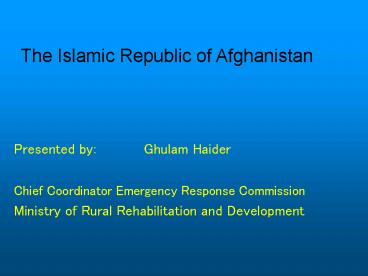humanitarian affairs unama PowerPoint PPT Presentation
1 / 12
Title: humanitarian affairs unama
1
The Islamic Republic of Afghanistan
Presented by Ghulam Haider Chief
Coordinator Emergency Response Commission
Ministry of Rural Rehabilitation and Development
2
Types of Disaster in Afghanistan
Natural and man-made hazards
- Earthquake
- Avalanche
- Landslide
- Flood
- Drought
- War (IDPs, Returnees)
3
(No Transcript)
4
(No Transcript)
5
(No Transcript)
6
(No Transcript)
7
Hazard and Vulnerability
- The country has experienced 118 large-scale
disasters since 1954 which has resulted in the
killing of 21,346 and has affected 10,989,211
individuals. Three decades of rigorous war has
further deteriorated the already vulnerable
condition of the people. Poor infrastructure and
lack of awareness has made people more vulnerable
and prone to disasters
8
National Emergency Response Commission
Chairman Vice President
Deputy Ministry of Rural Rehabilitation and
Development
Secretariat Department for Disaster Preparedness
- Mo Agriculture
- Mo Finance
- Mo Interior
- Mo Public Health
- Mo Defence
- Mo Information Culture
- Mo Transport
- Mo Mines Industries
- Mo Urban Development
- Mo Public Works
- 11. Mo Energy Water
- 12. Mo Refugees
- 13. Afghan Red Crescent Society
- 14. Kabul Municipality
- 15. UNAMA (United Nations Assistance Mission for
Afghanistan) - 16. ISAF (International Security Assistance
Forces)
9
National Emergency Response Commission
Emergency Rehabilitation
Food Pre-Positioning
Relief
Rehabilitation Reconstruction
Preparedness Mitigation
Technical Assessment of the Projects
Snow Clearing Projects
10
National Emergency Operation Center
District Administrator
Informs
Governor
Informs
Provincial Emergency Response Commission
Provincial Emergency Commission Its a
commission which is chaired by the provincial
governor with all government, non government and
UN organizations members to it
11
Need for Assistance
Military and Civil Defence Assets
International Civilian Relief
Local/National Response
Time
12
Our future plan
- Developing provincial, district and community DM
plans - Capacity building of the Department of Disaster
Preparedness - Disaster Risk Reduction awareness at Province -
District Community levels. - Prevention and Mitigation Projects.
- Developing the capacity of National Emergency
Operation Center (NEOC) into a responsive
coordination body - Developing a better communication network between
capital and provinces and further down to
districts
13
Our Limitations
- Absence of good coordination
- Shortage of sufficient Human Capacity.
- Absence of early warning system and technology.
- Absence of relief stock, lack of Humanitarian
Assistance Items. - Lack of facilities for rescue operations such as
helicopter, heavy machinery, fire fighting
trucks and tankers.
14
The End
- Thank You for your Attention

